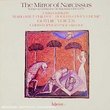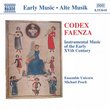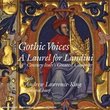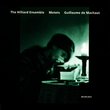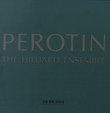| All Artists: Robert Harre-Jones, Charles Daniels, Angus Smith, Donald Grieg, Orlando Consort Title: Philippe de Vitry and the Ars Nova Members Wishing: 2 Total Copies: 0 Label: Amon Ra Release Date: 3/6/1995 Genres: Special Interest, Pop, Classical Styles: Vocal Pop, Opera & Classical Vocal Number of Discs: 1 SwapaCD Credits: 1 UPC: 750582238321 |
Search - Robert Harre-Jones, Charles Daniels, Angus Smith :: Philippe de Vitry and the Ars Nova
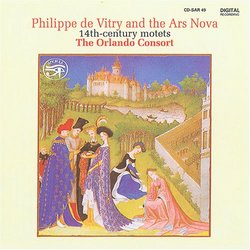 | Robert Harre-Jones, Charles Daniels, Angus Smith Philippe de Vitry and the Ars Nova Genres: Special Interest, Pop, Classical When you think medieval music, chances are the name Philippe de Vitry doesn't come immediately to mind. But this very fine recording by the Orlando Consort may change that. After all, contemporaries of the composer thoug... more » |
Larger Image |
CD DetailsSynopsis
Amazon.com When you think medieval music, chances are the name Philippe de Vitry doesn't come immediately to mind. But this very fine recording by the Orlando Consort may change that. After all, contemporaries of the composer thought enough of him to call him "the finest figure in the entire musical world" and "the outstanding prince of musicians." These four male voices--countertenor, two tenors, and baritone--familiarize us with 19 motets, the most interesting of which were composed to illustrate a satirical, allegorical poem, "Le roman de Fauvel," whose texts are highly critical of the author's adversaries. The music is full of correspondingly bold, stark harmonies and strongly accented rhythms. It's not the stuff of easy listening, but it's a fascinating look at a rarely seen body of worthy works. --David Vernier Similar CDs
|
CD ReviewsAnother Stunning Performance! Giordano Bruno | Wherever I am, I am. | 07/20/2007 (5 out of 5 stars) "De Vitry is best known (and only to musicologists) as the mastermind of the new musical notation which made ars nova polyphony possible, and which led to the development of modern notation. The evidence of his role is provisional, and the attribution of the motets on this CD to him is quite speculative, but if it's correct, then he was one of the greatest musical innovators of all time. Now the virtuosity of the Orlando Consort has brought this crucial repertory to life in a performance of such beauty and subtlety that the listener can forget about scholarship and just bask in sound. The art of this music is chiefly in the complex polyrhythmic development of relatively transparent harmonic progressions. As usual, the Orlando's control of phrasing and tuning is phenomenal. I have one huge gripe, however. There are no texts! These motets, most of them poly-textual, are of great literary interest. They are not just the usual love-stuff; they include mordant satire of 14th C society and of the church, as well as witty self-reflections. Still, the musical values are so strong that I have to rate the CD as five stars... or let's say as seven stars, minus two for the lack of texts."
|

